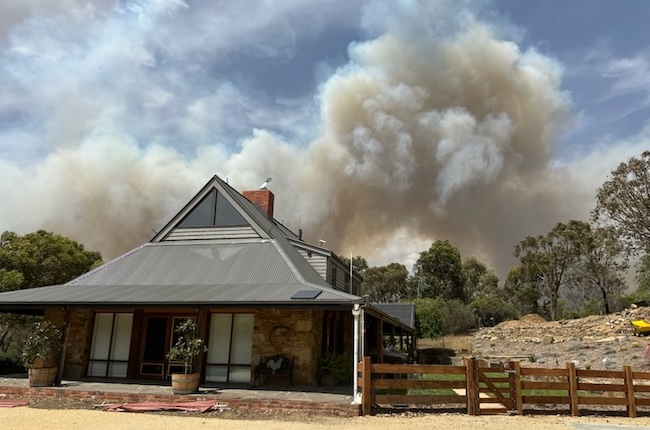The housing crisis in Australia is already bad enough without media stereotyping tenants and landlords into victims and villains, writes Rosemary Sorensen.
MEDIA STORIES about evicted tenants tend to flatten the narrative into villain versus victim, drawing in secondary characters such as neighbours and relatives to capture incendiary quotes that deepen the divide between two sides.
How much peace and quiet we're entitled to, for example, is a relative question at a time when every day the news out of Palestine shows us people traumatised by death and destruction. Maybe the noise of heavy metal booming through your loungeroom wall is tolerable after all — but the toddler is crying and you’ve got to get up early to catch a train and you’re worried your headache needs a doctor’s visit.
Angry that the boofhead next door is so selfish? Fair enough.
There’s a character in British writer Andrew O’Hagan’s provocative, funny, kaleidoscopic novel Caledonian Road who is, you’d have to say, not your ideal neighbour. She lives in the basement flat of a double-storey house in a genteel part of London and she’s nasty.
This character is on an assured rental scheme so cannot be evicted. Before you weigh in on that topic, as we watch the argy-bargy here in Australia about no-fault evictions and what’s seen as a shift in power from landlords to tenants, it needs to be noted that the rights of tenants to stay, even if the property is sold, was made law in Britain in 1969 for tenant agreements prior to that year.
O’Hagan therefore makes his tenant-from-hell an elderly – nay, old – woman who came with the unit when the story’s central character, a charismatic and arrogant university professor and his aristocratic wife, buys the whole house, basement flat included.
The tenant complains a lot and can be heard night and day, with unidentifiable sounds rising through the floor. She won’t let workers in to fix whatever she’s complaining about and then takes the complaint to the council, who sends compliance letters to the owners, who then try (he does, at any rate, she leaves it to him) to reason with her.
If this sounds unfair, O’Hagan makes no effort to give you reasons to side with the tenant, who, it turns out, has co-opted a real estate agent to tell the owners she’ll move out if they give her half a million pounds. We do eventually find out a bit about the vindictive woman in the basement who is borderline crazy, but what O’Hagan wants us to watch is the increasing fury of the professor.
Too bad, O’Hagan seems to be saying about the frustrating situation the landlord finds himself in. Here’s a man with talent, prestige, not just one but two homes, a caring wife, competent kids and powerful friends. His inability to find a way to deal with a vexing, distressing problem that intrudes on his life (which is descending into chaos in a bunch of other ways) will be his last straw, the one that breaks the camel’s back.
What happens to both landlord and tenant is not pretty, it’s not even fair. There just doesn’t appear to be any sensible, helpful, kind way out. Sort of a metaphor for so many situations created by people, for people.
But – and here’s the rub – what about if it’s you, not some fictional fellow whose dilemma is written for us as entertainment, albeit uncomfortable, whose daily life is cruelled by the intentionally disruptive behaviour of those who live close by? This is a huge topic.
In real life, there are so many different scenarios that mean someone is a landlord and another person a renter, but, again, it’s the argy-bargy of a supposedly two-sided contest that makes the reporter’s story. Calling out the selfishness of property owners who refuse to do repairs or who evict or raise rents above what’s reasonable is long overdue, but where were the righteous back when negative gearing was on the policy agenda?
Here's a scenario about owners and renters that won’t make the villain-victim style of reporting: a young family, grieving the death of the husband in an accident, is able to buy a house with the compensation and plans to do a few renovations before moving in. Working on the new place, the kids are playing in the backyard when the man next door, already known in the neighbourhood for the loud abusive fights he has with his wife, looms over the fence and shouts at the kids, who run inside, frightened.
It's too much, too soon after the loss of their father, so the family makes the big decision to stay in their rental home and rent out the house they now own so that they have at least that stability in their lives. Maybe down the track, they can take another look at moving into their own home, but, for now, they’ll let it to someone else.
Stories about investors with a stack of properties they rent out with little or no concern for the rights of the tenants make caring people angry and those with properties defensive. What would be good – and it’s a big ask – is for stories about important changes to tenants’ rights not to infer that a landlord is a Landlord, and a tenant a Tenant. In other words, not to essentialise people, to create stereotypical identities.
This can be done by focusing on the policy and why it works, not by doing that thing news outlets think is the only way to report on anything — find a victim and identify a villain.
As for the fearmongering about changes to renters’ rights prompting a rush of sales that will reduce the availability of rental properties, this is the preferred modus operandi of single-interest groups who have a compliant media ever too ready to disseminate their thought bubble as news.
But, I fear, that cartoon-style reporting is what media thinks is what constitutes “good” reporting. Full of cliché. Fudging the subtle stuff. Pushing a reader to take sides, to feel outrage, to be titillated by a nasty fight. This might be considered entertaining if you’re into aggression, but, in a world full of grieving, it doesn’t help the collective yearning for a safe home.
Rosemary Sorensen was a newspaper, books and arts journalist based in Melbourne, then Brisbane, before moving to regional Victoria, where she founded the Bendigo Writers Festival, which she directed for 13 years.
Related Articles
- Dirty little housing crisis secrets hidden by the mainstream media
- Bank of Mum and Dad making it harder for those less fortunate
- How Labor can avoid the negative gearing trap
- National Cabinet’s housing plan ambitious but lacking detail
- Economic reform vital to solving housing crisis
 This work is licensed under a Creative Commons Attribution-NonCommercial-NoDerivs 3.0 Australia License
This work is licensed under a Creative Commons Attribution-NonCommercial-NoDerivs 3.0 Australia License
Support independent journalism Subscribe to IA.














